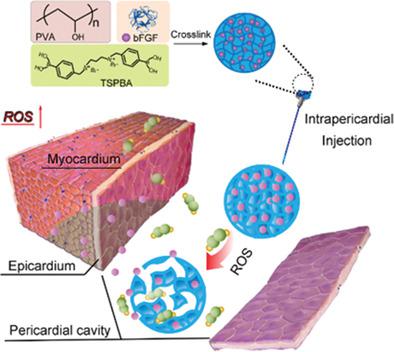当前位置:
X-MOL 学术
›
Adv. Funct. Mater.
›
论文详情
Our official English website, www.x-mol.net, welcomes your
feedback! (Note: you will need to create a separate account there.)
Injection of ROS‐Responsive Hydrogel Loaded with Basic Fibroblast Growth Factor into the Pericardial Cavity for Heart Repair
Advanced Functional Materials ( IF 18.5 ) Pub Date : 2021-02-04 , DOI: 10.1002/adfm.202004377 Zhenhua Li 1, 2, 3 , Dashuai Zhu 2, 3 , Qi Hui 1 , Jianing Bi 1 , Bingjie Yu 1 , Zhen Huang 1 , Shiqi Hu 2, 3 , Zhenzhen Wang 2, 3 , Thomas Caranasos 4 , Joseph Rossi 5 , Xiaokun Li 1 , Ke Cheng 2, 3 , Xiaojie Wang 1
Advanced Functional Materials ( IF 18.5 ) Pub Date : 2021-02-04 , DOI: 10.1002/adfm.202004377 Zhenhua Li 1, 2, 3 , Dashuai Zhu 2, 3 , Qi Hui 1 , Jianing Bi 1 , Bingjie Yu 1 , Zhen Huang 1 , Shiqi Hu 2, 3 , Zhenzhen Wang 2, 3 , Thomas Caranasos 4 , Joseph Rossi 5 , Xiaokun Li 1 , Ke Cheng 2, 3 , Xiaojie Wang 1
Affiliation

|
Myocardial infarction, among other ischemic heart diseases, is the major cause of mortality and morbidity for patients who have heart diseases. Timely reperfusion of the ischemic myocardium is the most effective way to treat myocardial infarction. However, blood reperfusion to the ischemic tissues leads to an overproduction of toxic reactive oxygen species (ROS), which can further exacerbate myocardial damage on top of ischemic injury. ROS has been used as a diagnostic marker and therapeutic target for ischemia‐reperfusion (I/R) injury and as an environmental stimulus to trigger drug release. In this study, a ROS‐sensitive cross‐linked poly(vinyl alcohol) (PVA) hydrogel is synthesized to deliver basic fibroblast growth factor (bFGF) for myocardial repair. The therapeutic gel is injected into the pericardial cavity. Upon delivery, the hydrogel spread on the surface of the heart and form an epicardiac patch in situ. In a rat model of I/R injury, bFGF released from the gel could penetrate the myocardium. Such intervention protects cardiac function and reduces fibrosis in the post‐I/R heart, with enhanced angiomyogenesis. Furthermore, the safety and feasibility of minimally invasive injection and access into the pericardial cavity in both pigs and human patients are demonstrated.
中文翻译:

向心包腔内注射装有碱性成纤维细胞生长因子的ROS响应水凝胶,以进行心脏修复
除其他缺血性心脏病外,心肌梗塞是心脏病患者死亡和发病的主要原因。及时缺血心肌的再灌注是治疗心肌梗塞的最有效方法。但是,血液对缺血组织的再灌注会导致有毒的活性氧(ROS)过量产生,这会在缺血性损伤之外进一步加重心肌损伤。ROS已被用作缺血再灌注(I / R)损伤的诊断标志物和治疗靶标,并被用作触发药物释放的环境刺激。在这项研究中,合成了一种ROS敏感的交联聚乙烯醇(PVA)水凝胶,以提供碱性成纤维细胞生长因子(bFGF)进行心肌修复。将治疗凝胶注入心包腔。交付时,水凝胶在心脏表面扩散,并在原位形成心外膜片。在I / R损伤的大鼠模型中,从凝胶释放的bFGF可以穿透心肌。这种干预措施可增强心脏血管生成,从而保护心脏功能并减少I / R后心脏的纤维化。此外,还证明了在猪和人类患者中进行微创注射和进入心包腔的安全性和可行性。
更新日期:2021-04-08
中文翻译:

向心包腔内注射装有碱性成纤维细胞生长因子的ROS响应水凝胶,以进行心脏修复
除其他缺血性心脏病外,心肌梗塞是心脏病患者死亡和发病的主要原因。及时缺血心肌的再灌注是治疗心肌梗塞的最有效方法。但是,血液对缺血组织的再灌注会导致有毒的活性氧(ROS)过量产生,这会在缺血性损伤之外进一步加重心肌损伤。ROS已被用作缺血再灌注(I / R)损伤的诊断标志物和治疗靶标,并被用作触发药物释放的环境刺激。在这项研究中,合成了一种ROS敏感的交联聚乙烯醇(PVA)水凝胶,以提供碱性成纤维细胞生长因子(bFGF)进行心肌修复。将治疗凝胶注入心包腔。交付时,水凝胶在心脏表面扩散,并在原位形成心外膜片。在I / R损伤的大鼠模型中,从凝胶释放的bFGF可以穿透心肌。这种干预措施可增强心脏血管生成,从而保护心脏功能并减少I / R后心脏的纤维化。此外,还证明了在猪和人类患者中进行微创注射和进入心包腔的安全性和可行性。













































 京公网安备 11010802027423号
京公网安备 11010802027423号